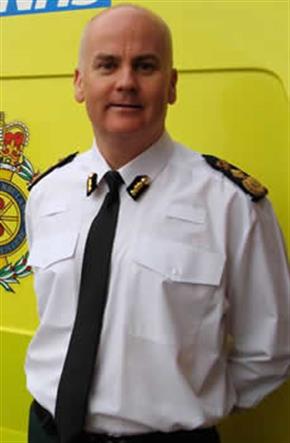Date:
20 April 2024
Page URL:
https://ntk.eastamb.nhs.uk/news/Pre-launch news/update-from-dr-anthony-marsh.htm?pr=
Update from Dr Anthony Marsh

We’ve dealt with a few ‘out of the ordinary’ incidents this week that have really demonstrated why we do the amount of emergency planning we do! On Friday (February 28) we were called to a chemical incident at a school in Bishops Stortford, Hertfordshire, where 33 patients (the majority of them schoolchildren) were complaining of bronchial inflammation after accidently inhaling chemicals in a chemistry lesson. We got to the scene quickly, assessed all the patients and gave treatment to nine. Thanks to the hard work of everyone on scene, only two patients needed us to take them for further treatment at hospital. And on Tuesday (March 4) we dealt with two patients who had fallen into a slurry pit in Otley, Suffolk. One was trapped under a concrete slab and it took a lot of skill and partnership working between us and the fire service to extricate him safely. Well done and thank you to everyone involved in these incidents; they are just two of the thousands we deal with on a weekly basis, but they really go to show how well prepared, experienced and capable our staff are.
Now we need to make sure that every patient gets that kind of service. I think most of us would agree that one of our biggest and most serious problems at the moment is simply getting to patients quickly enough. We also need to ensure we start to achieve response targets, as well as ensure the clinical care we actually give at scene is of the highest quality. In that light, we’re planning on creating our own internal ‘floor targets’; that basically means that for every grade of call (i.e. R1, R2, G1 etc.) we will say ‘no patient should ever wait longer than XX minutes for a response’, for example 60 minutes. Now that doesn’t mean that we’re satisfied with that response, but that anything over that time should be a never-event, i.e. never happen. Every time we miss that internal target and a patient waits longer than they should, it will be internally reviewed by a member of the clinical team. They will identify any clinical risk, and if it’s found that the delay caused harm to the patient, it will be raised as a serious incident (SI).
Following on from concerns raised by staff last year over the use of RRVs to hit the A19 'transportable' target, the internal floor targets will also include the time taken to get an ambulance on scene. The A19 'transportable' target is something I am pushing to get changed nationally. Patient care and safety is paramount and I want to demonstrate that we’re taking this seriously. I do not want our patients to be waiting too long for us to arrive, or for you to be waiting for back-up on scene, for dangerous amounts of time. Patient care and safety is paramount and I want to demonstrate that we’re taking this seriously. I do not want our patients to be waiting too long for us to arrive, or for you to be waiting for back-up on scene, for dangerous amounts of time.
In other news, I’m pleased to say that the first of our new student paramedic courses is starting next month in Norwich. There are 24 places available, and we’ve already offered a number of these to successful candidates. I am delighted with the response we have had and that we’ve managed to get such a quick turnaround; it just shows what we can do, and how quickly we can do it, when we all get behind the same priority. As I’ve said right from the off, recruiting student paramedics is an absolute ‘must-do’ for the Trust and to see the first training places being filled is another step in the right direction. As we recruit more student paramedics we will be running more training courses across the region throughout the year, so watch this space.
It’s important to reiterate though that we’re not just stopping there; getting 400 student paramedics out there treating patients will help, but it still won’t cover the ‘gap’, i.e. the amount of paramedics we need. So we’ll continue to recruit graduate paramedics as they come out of university, as well as qualified paramedics and EMTs who might want to join us from elsewhere. This means we can really grow the numbers of staff we have, and ultimately more qualified staff means a better service for our patients. It will take a lot of recruitment work both next year and the year after to get us to where we need to be, but I have no doubt that we will succeed. And of course, all of this will be running alongside the development of our own ECAs and EMTs. It all adds up to a really positive step forward.
